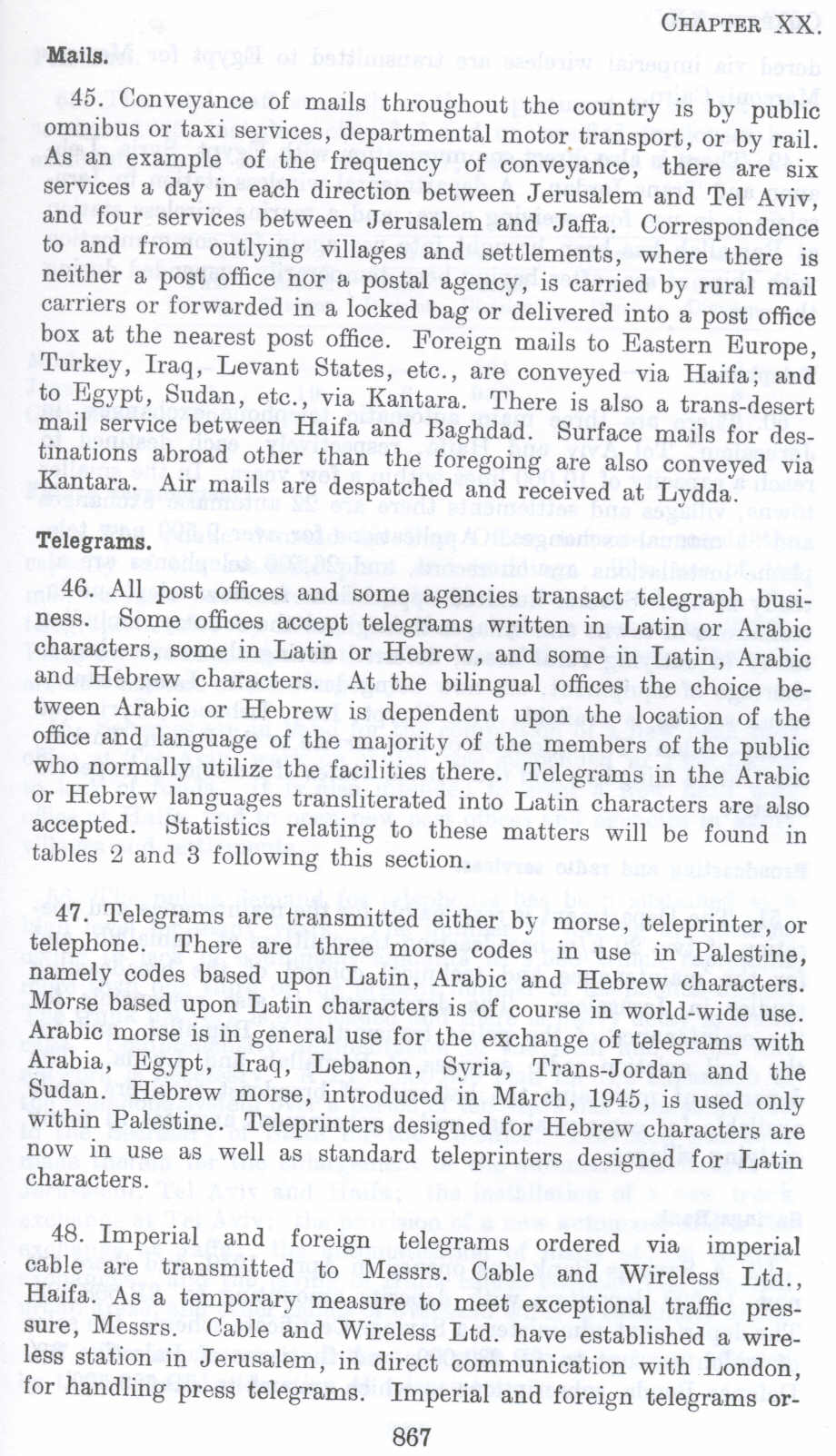| Prev | Next |  |
| Prev | Next |
| PalestineRemembered | About Us | Oral History | العربية | |
| Pictures | Zionist FAQs | Haavara | Maps | |
| Search |
| Camps |
| Districts |
| Acre |
| Baysan |
| Beersheba |
| Bethlehem |
| Gaza |
| Haifa |
| Hebron |
| Jaffa |
| Jericho |
| Jerusalem |
| Jinin |
| Nablus |
| Nazareth |
| Ramallah |
| al-Ramla |
| Safad |
| Tiberias |
| Tulkarm |
| Donate |
| Contact |
| Profile |
| Videos |
British Mandate: A Survey of Palestine: Volume II - Page 867 |
Disclaimer
The above documents, article, interviews, movies, podcasts, or stories reflects solely the research and opinions of its authors. PalestineRemembered.com makes its best effort to validate its contents.


Post Your Comment
*It should be NOTED that your email address won't be shared, and all communications between members will be routed via the website's mail server.
Mails.
45. Conveyance of mails throughout the country is by public omnibus or taxi services, departmental motor. transport, or by rail. As an example of the frequency of conveyance, there are six services a day in each direction between Jerusalem and Tel Aviv, and four services between Jerusalem and Jaffa. Correspondence to and from outlying villages and settlements, where there is neither a post office nor a postal agency, is carried by rural mail carriers or forwarded in a locked bag or delivered into a post office box at the nearest post office. Foreign mails to Eastern Europe, Turkey, Iraq, Levant States, etc., are conveyed via Haifa; and to Egypt, Sudan, etc., via Kantara. There is also a trans-desert mail service between Haifa and Baghdad. Surface mails for destinations abroad other than the foregoing are also conveyed via Kantara. Air mails are despatched and received at Lydda.
Telegrams.
46. All post offices and some agencies transact telegraph business. Some offices accept telegrams written in Latin or Arabic characters, some in Latin or Hebrew, and some in Latin, Arabic and Hebrew characters. At the bilingual offices the choice between Arabic or Hebrew is dependent upon the location of the office and language of the majority of the members of the public who normally utilize the facilities there. Telegrams in the Arabic or Hebrew languages transliterated into Latin characters are also accepted. Statistics relating to these matters will be found in tables 2 and 3 following this section.
47. Telegrams are transmitted either by morse, teleprinter, or telephone. There are three morse codes in use in Palestine, namely codes based upon Latin, Arabic and Hebrew characters. Morse based upon Latin characters is of course in world-wide use. Arabic morse is in general use for the exchange of telegrams with Arabia, Egypt, Iraq, Lebanon, Syria, Trans-Jordan and the Sudan. Hebrew morse, introduced in March, 194•5, is used only within Palestine. Teleprinters designed for Hebrew characters are now in use as well as standard teleprinters designed for Latin characters.
48. Imperial and foreign telegrams ordered via imperial cable are transmitted to Messrs. Cable and Wireless Ltd., Haifa. As a temporary measure to meet exceptional traffic pressure, Messrs. Cable and Wireless Ltd. have established a wireless station in Jerusalem, in direct communication with London, for handling press telegrams. Imperial and foreign telegrams or-
867